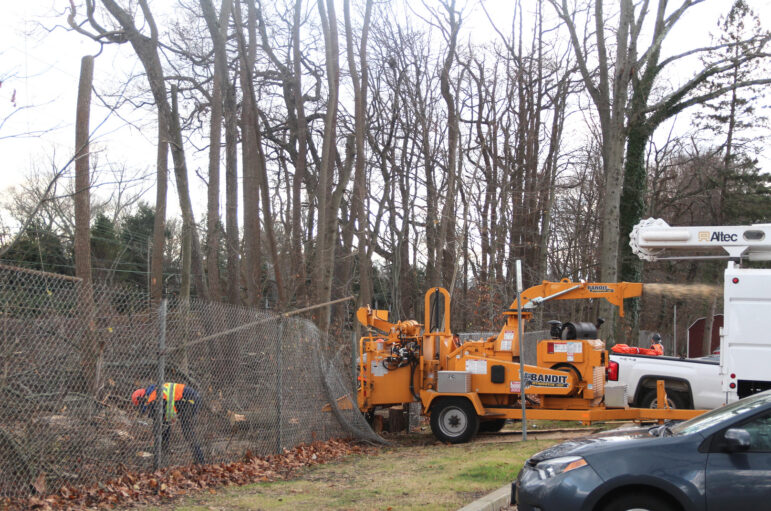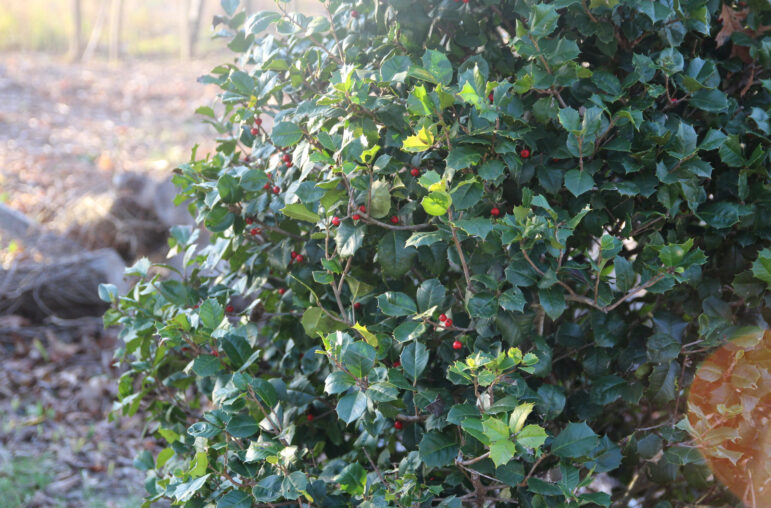Last week an online petition about tree trimming and clearing on the north side of the train tracks by Riverside School near the Drinkwater Bridge, gave voice to residents’ objections to extensive tree cutting by Metro North.
Neighbors were disappointed they had not been notified in advance that the trimming would take place.
Metro North say it is their right to perform tree trimming in their right of way, and that trimming under and adjacent to the overhead lines is critical to preventing service disruptions, especially during storms.

Metro North noted their right of way is wider in this particular area – approximately 75’-100’ – whereas their property is typically 25’-50’ from the outside track.
Metro North also said the tree trimming in this area was long overdue. They noted over 300 trees blew down during Hurricane Isaias in August, and that the trees being removed are decayed, creating a risk of falling on the tracks or the catenary lines. (The railroad uses a catenary system of overhead wires that supply electricity to the railroad.)
Also, they noted there are instances when trees fall into drainage ditches, which can back them up and cause flooding.
They also noted it is not their policy to reach out to residents before tree trimming, though they do reach out in advance of capital projects that will present a quality of life or noise issue.
In this case, Metro North did connect with the tree warden as well as Riverside School and promised their work would not impact drop off or pick up at the school.
While residents said they believed the trees functioned as a buffer to noise, Metro North said the trees being removed have no vegetation on top and therefore do not provide much of a sound barrier.
This week, as the tree trimming continued, contractors put debris through a wood chipper to be taken away. Specifically, the contractor is tasked with removing trunks, limbs and branches, leaving only stumps as they are not a hazard.
Further, Metro North said they have no plans to landscape the area that has been cleared.
However, according to Metro North, if there are trees with some historical significance – perhaps a 100 or 200 year old tree that is still in good shape – they said they would consider working with a municipality and consider leaving it in place.
Greenwich tree warden Dr. Greg Kramer said on Thursday that Metro-North’s tree trimming project in Riverside has two parts, the first being the area in the right of way by Riverside School that the neighbors were concerned about.
He said it was his understanding that the tree removal will start by Drinkwater and extend as far as the last parking spot at Riverside School.
“They will clear cut everything from the road to the last parking spot because of the liability of the trees closer to the parking lot at Riverside School,” he said.
The second area to be targeted for trimming, Dr. Kramer said, is to the west, in the approach to the Riverside Train Station. He said he planned to work with Metro-North to look selectively at removing trees.
Dr. Kramer said he looked forward to walking that stretch with a Metro-North supervisor and arborist to discuss what will be removed.
“There’s some nice Sassafras that I’d like to keep. There are also some nice Oak trees, and some Elm trees, which would be nice to keep,” he said.
“I asked if we could focus on non-natives removals. There’s some Ailanthus, and they’re the preferred host for the Spotted Lanternfly (an invasive insect indigenous to parts of Southern China, Taiwan, and Vietnam, that has spread to the US), andmy feeling is I’d be happy if Metro North would remove them,” he said.
Ailanthus, also known also as the Tree of Heaven, stinking sumac, Chinese sumac, varnish tree and stink tree, grows quickly and releases a strong, offensive smell, particularly from its flowers.

Dr. Kramer said he hoped Metro-North might consider planting American Holly in the area along Riverside School.
He said American Holly grows to about 30 ft, and, because of its conical form, brings no concern about branches falling.
Further, he said American Holly is “super tough,” and can be even be seen growing in Long Island sand dunes. American Holly, which is native, also provides cover for birds and offers screening.
“I hope they start thinking about replanting,” he said. “It would be nice if they put something back in there. I think they would be a good gesture for everybody as well.”
Greenwich Tree Conservancy director JoAnn Messina said on Wednesday that she was disappointed at the situation.
“The Greenwich Tree Conservancy is very concerned about the clear cutting along the railroad track next to Riverside School,” she said in an email. “The benefits of these trees to school children is immense. We trust the tree warden will control the amount of trees coming down. And with the BOE’s consent, the GTC would be willing to plant trees on school property to assist in buffering this area.”
Earlier in the week First Selectman Fred Camillo said that while the clear cutting that is going on along the train tracks is under and within the jurisdiction of Metro North, “I, along with Tree Warden Dr. Kramer, continue to discuss with them ways to mitigate the negative effects of the action, as well as work with Town officials and the Tree Conservancy to see where we can plant trees and provide screening on Town property for residents.”
Stay tuned.